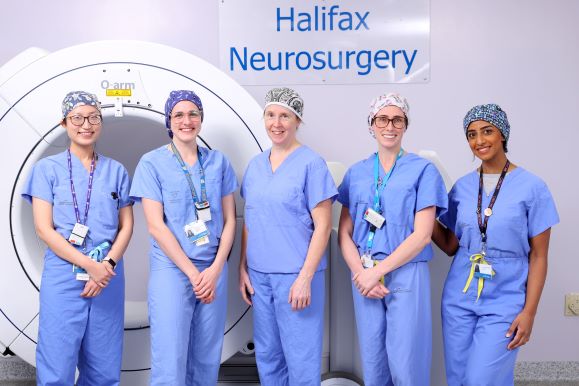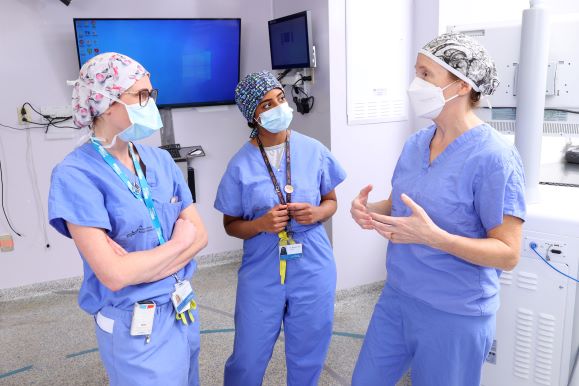News
» Go to news mainDal neurosurgery residency attains gender parity

Correction: An earlier version of this story misattributed Dalhousie's neurosurgery program as the first in the country to reach gender parity.
A program at Dalhousie University’s Faculty of Medicine is among the first in the country to achieve gender parity among trainees.
The Division of Neurosurgery’s six-year postgraduate training program, one of the most competitive programs for residents, has achieved an equal distribution of males and females among learners. In fact, with six of the 11 trainees in the program identifying as female, they have actually surpassed it.
Neurosurgery is externally acknowledged as a very difficult speciality, with long, complicated cases, and high stakes. Operative decisions can mean removing a tumor and saving a life, but also risking the language or personality centre of the brain.
So why is it that a speciality that requires a surgeon to give so much of themselves both physically and emotionally has an increasing number of female trainees?
“Mentorship has a trailblazing effect,” says Dr. Gwynedd Pickett, director of the neurosurgery postgraduate training program. “If you get one or two women in it helps open the door for others, and it allows for role modeling. If you can see it, you can be it.”
When Dr. Pickett became program director in 2019, gender parity was not on her radar. What was, was providing an environment that was welcoming and inclusive for all learners.
“I made a concerted effort when I was reviewing our selection criteria for residents, and when advertising what we’re looking for in applicants, to have language that reflected our values of diversity and inclusivity,” says. Dr. Pickett. “There was a thoughtful attempt at recognizing intrinsic bias.”
Dr. Pickett notes there is also a change in the expectations around the practice of medicine, and the practice of surgery. The unpredictable hours will remain, but it’s no longer expected that surgery is the only thing a physician has in their life.
“Working with Dr. Pickett as a medical student was one of the main reasons that I chose a career in neurosurgery,” says Dr. Erika Leck, the program’s chief resident. “I saw the way she was able to balance the many demands of this job, and the way she championed and prioritized the learning environment for medical students and residents alike.”

(L-R) Drs. Suna Jung, Katherine Tourigny, Gwynedd Pickett, Jenna Smith-Forrester, and Balgees Ajlan (Photo: Nick Pearce)
An inclusive environment
The Division of Neurosurgery is made up of 10 faculty members, two of whom are women, which is above average for the country. According to 2019 statistics, there were about 333 practicing neurosurgeons in Canada, and only 10 per cent of them women.
Each year the Division of Neurosurgery receives on average 20-28 applications and takes one to two residents. In the last few years there has been an overall increase in female applicants to the program, with nearly half of all applicants in 2022 being women—a drastic shift from when Dr. Pickett was applying.
“When I went through CaRMS (Canadian Residency Matching Service) 25 years ago I was the only woman applying to neurosurgery out of a couple of dozen applicants,” she recalls. “Last year, half of the applicants were women, which was really surprising.”
With an influx of female residents, the program recently reached another milestone. For two consecutive months, the resident call schedule was managed completely by women. Though Dr. Pickett admits this happened, in part, by fluke, it is also reflective of the growing number of females in the division and is something that is rare.
“For a surgical service an entirely female resident call schedule is uncommon and definitely hasn't happened before for us.”
Female role models
Dr. Suna Jung is a first-year resident in the program and says the strong female presence was one of the reasons she wanted to train at Dalhousie.
“It is important for learners to have role models they can identify with. In a traditionally male-dominated field, it was inspiring to see Dr. Pickett as program director and a strong female representation within the resident group during our interviews and information sessions.”
The growing trend of women in neurosurgery is not specific to Dalhousie, with other programs in the country also reaching or approaching gender parity. At Dalhousie however, this milestone was reached in the summer of 2022.
“I knew we were approaching it,” recalls Dr. Pickett. “But I blinked and realized we were majority female, which has been almost unprecedented in Canada, and across North America.”
She admits it is hard to fact check, not having residency lists internationally, but she is confident in being among the first programs to reach gender parity in the country, something Dr. Jung admits she is grateful to share in.
“I am honoured to be part of the program that reached this milestone, and I hope this encourages even more women to consider neurosurgery as their career,” she says. “It is an exciting step towards gender parity in neurosurgery faculty and achieving diversity in other domains.”

(L-R) Drs. Jenna Smith-Forrester, Balgees Ajlan, and Dr. Gwynedd Pickett in the operating room. (Photo: Nick Pearce)
Women supporting women
Being among the first programs in Canada to achieve gender parity is certainly worth bragging rights. But what program director Dr. Pickett is most proud of is that both her female and male colleagues have cultivated a welcoming, inclusive environment where learners feel supported, and where women want to come.
“Women are choosing to come here because they see it as a place that can support their career and can recognize and develop their potential,” says Dr. Pickett. “When I think about us being majority female, I’m filled with such a warm feeling—we have built a place where that is possible.”
Dr. Leck, who is nearing the end of her residency training, and who was the only woman in the program when she started, is excited to see more females entering into neurosurgery and says it highlights the supportive nature of the program.
“I picked this program because I loved the specialty, and I had a lot of respect for the program and the way that they treated their residents,” she says. “As the program has come to include more female residents, this has never changed, and the program has remained as inclusive and supportive as it ever was, without gender ever feeling like it was a significant card on the table.”
Dr. Pickett intends to keep building on that inclusivity. She and her surgical colleagues are committed to addressing all resident education with more than just a gender lens. Using an equity lens, Dr. Pickett intends to address representation of African Nova Scotian and Indigenous students, two groups she notes have historically been under-represented among applicants to the program.
“I don't want to say, ‘oh, we've got 50 per cent women and now we're done,’” says Dr. Pickett. “Medicine, and surgery in general, is still not fully representative of the communities that we practice in and serve. And that's something that I think we can continue to work on.”
Recent News
- New global study Highlights the Biological Roots of Anxiety
- Dalhousie and NCIME launch first‑of‑its‑kind program in Membertou First Nation
- A message from Wanda M. Costen, PhD, Provost and Vice President Academic
- Rhodes scholar Sierra Sparks returns home to study medicine
- President Kim Brooks, Dr. Pat Croskerry appointed to Order of Canada
- Dal’s Highly Cited Researchers reflect on influential global research alliances
- A New Bursary Supporting Black Medical Students at Dalhousie
- Dalhousie’s first physician assistant cohort steps into Nova Scotia’s healthcare system
